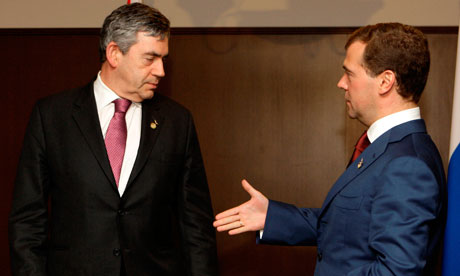WikiLeaks cables: UK on constant alert to Russian espionage
Leaked dispatches reveal British-Russian relations stalled since death of spy-turned-dissident Alexander Litvinenko

Russia poses a "real intelligence threat" to Britain, with suspected undercover agents frequently applying for UK visas, Foreign Office officials have told the White House.
A series of leaked diplomatic cables from the US embassy in London, released by Wikileaks and seen by the Guardian, paint a disheartening and gloomy picture of British-Russian relations in the three years since the fatal 2006 poisoning of Alexander Litvinenko, the Russian spy-turned-dissident.
There had been no let-up in Russian espionage activities in London and Russia's domestic spy agencies had hounded Russian staff working at the British embassy in Moscow, according to a briefing by UK officials to their US counterparts.
On 10 August 2008, US officials reported back on Gordon Brown's first one-to-one meeting with Dmitry Medvedev at the G8 summit in Japan. Medvedev had just taken over as Russia's president, with ex-president Vladimir Putin becoming prime minister.British officials described the Brown-Medvedev encounter as positive. The Russia department of the Foreign Office (FCO) expressed hopes that Medvedev was a leader "more open to domestic liberalisation and co-operation with Britain" than Putin, his hard-line, Anglophobic predecessor.
Despite "signs of a thaw in top-level UK-Russia relations", the FCO said it saw no reason to remove sanctions imposed on Russia. In July 2007 the then foreign secretary, David Miliband, expelled four Russian diplomats and cut links with Russia's FSB spy agency after Moscow refused to extradite Andrei Lugovoi, Litvinenko's alleged killer. Miliband also imposed a visa regime on Kremlin officials visiting London.The cable said: "According to the FCO, HMG (Her Majesty's government) has had good reasons to refuse many Russian visa requests. HMG officials see a real 'intelligence threat from' Russia (in addition to China) and regret a 'missed opportunity in the late 1990s and early 2000s to assess these intelligence threats'."
FCO officials told Washington the Russian government was restricting visas to UK diplomats, prompting reciprocal British measures. They revealed that the government was unable to fully staff the British embassy in Moscow because the FSB was continuously harassing its "local Russian hires".
Britain had proposed a deal to ease visa restrictions, but the offer had run into problems because Russia was insisting that the British government had to consult first with the FSB. "HMG continues to refuse to engage directly with the FSB, pending resolution of the Litvinenko murder case," Richard LeBaron, deputy head of the US embassy in London, wrote.
During their G8 meeting, Brown briefly brought up the Litvinenko murder and Britain's Lugovoi extradition request. Medvedev did not budge. He described Litvinenko's death as a sad affair but "sought to bury the matter by referring to it as a 'legal issue'". "No transformative dialogue occurred, and no progress was made on that issue," LeBaron told the White House.
In other classified dispatches, the US ambassador in Moscow, John Beyrle, expressed glum solidarity with Britain's attempts to bring Litvinenko's alleged killer to justice. In May 2007, when the Crown Prosecution Service charged Lugovoi, Beyrle reported that the British embassy was bracing itself for more diplomatic fallout, and expected a "further worsening in the UK-Russia and EU-Russia relationship".
As the UK's ally, all Washington could do was "reinforce to the Russian government the damaging consequences to Russia's reputation should this case fail to reach trial", Beyrle said. This attitude, however welcome in London, appears to have brought few practical results.In November 2009 Miliband flew to Moscow for a two-day visit that, according to Beyrle, put an end to the "period of standoff". Despite a cordial meeting with Russia's foreign minister, Sergei Lavrov, Miliband went home with "little concrete to show" from his Moscow visit, the US ambassador reported.
Both Medvedev and Putin refused to see Miliband, "apparently out of a desire to avoid giving Miliband a success that he could use in a potential run to head EU foreign policy", Beyrle observed. (Miliband had been approached for the job of the EU's new foreign secretary but turned the job down, convinced at the time that his future lay in Westminster politics.)
While Russia and the UK found some common ground during Miliband's visit, there was a "lingering hesitancy" from the Russian side. "The GOR (government of Russia) could have gone further in offering the UK (either land or air) to support British operations in Aghanistan, but hedged," Beyrle said.Other dispatches made clear that Russia remains a major strategic and policy headache for Britain. After the Brown-Medvedev meeting, Cabinet, FCO and intelligence principals conducted parallel exercises designed to give Brown a "clearer picture of Russian foreign policy", and recommendations on how to deal with the Kremlin.
Michael Davenport, the FCO's then director of Russia, Caucasus and central Asia, admitted there were internal divides in the government on how to tackle Russia. Some favoured "a posture of cold war-type 'containment'", while others argued that such a tactic was outmoded and inappropriate, LeBaron reported.Davenport said the UK believed Russia's foreign policy goal was to maintain influence over its "near abroad", and "to deter western influence, especially Nato enlargement". After the war in Georgia it was obvious Russia would use all available levers to pursue its goals, with "military means now part of the Kremlin's tactical lexicon", he said.
The Foreign Office description of Russia's political system is unlikely to delight the Kremlin, which insists the country is democratic, despite overwhelming evidence to the contrary. Today's Russia was a "corrupt autocracy", but it was a confident one, Davenport said.
